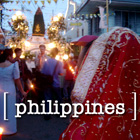
|
|||||||||||||||||
THE PRESIDENCY OF FERDINAND MARCOS LEGACY OF ECONOMIC HARDSHIP, POLITICAL ABUSES STILL FELT 22 February 2007 Demand for land reforms by poor farmers led to another Huk uprising, and political turmoil continued to wreak havoc on Philippine society. Social unrest eventually led the Marcos administration to tighten security measures and increase military campaigns to quash dissenters in 1969. Marcos won re-election that year, and his new term began under great duress, as allegations of corruption began to surface. [Full Story] |
PHILIPPINES: 'AROMA, LIGHT, COLOR, SONG' THE 7,100 ISLANDS OF THIS PACIFIC RIM NATION ARE HOME TO A RICH CULTURAL HERITAGE, AMID STUNNING NATURAL BEAUTY 17 January 2007
A low mumbling of congestion, cars, buses, bikes and jeepneys harmonize with pedestrians in urban chorus. Negotiating its way through a mixture of cooking smoke and tropical urban air, the salt of the seas soak clothes and voices alike. Sounds hover through the air under a pungent midday sun that shines over this country of more than 7,000 islands. Tempering brisk spirits and making strangers into instant friends, a humid atmosphere makes for willing faces, as a signature of Manila, the Philippines' capital city. Manila blends the charm and grace of old Asia with a developed commercial underbelly. In the Philippines, every transaction of business or pleasure is done with a common slowness over merienda (luncheon or tea). Infused with an imposed knowledge of the developed West through centuries of colonization, Philippine society, including over 76 million people, teems with life, color and the marketplace. Heavily influenced by Spain and the US, the Filipinos reflect a cultural diversity different from that of their neighbors. Filipino is the official national language, but over 70 regional languages are spoken. A considerable majority of the population speaks English, making the Philippines the third largest English-speaking population in the world. Made up of a mixture of Malay, Chinese, American, Spanish and Arab blood, the spirit of community and camaraderie distinguishes the Filipino character. As a predominantly Christian and English speaking democracy (80% Roman Catholic, 5% Muslim, 5% Aglipay, 4% Protestants), and with a favorable open market system, society offers nearly ever object of desire by a large and talented workforce of artisans and scientists alike. Cradled among the island nations of Southeast Asia, the Philippines offers visitors a taste of the quintessential tropical paradise. With an average annual temperature of almost 80°F, foliage is lush and an abundance of wildlife feed with few large predators at bay. Upland towns such at Baguio of Luzon, has an annual temperature almost fifteen degrees lower, making for a comfortable and popular holiday getaway from the intense heat. The nation is made up of 11 main islands: Luzon, Mindanao, Samar, Negros, Palawan, Panay, Mindoro, Leyte, Cebu, Bohol, and Masbate. Luzon is largest island, and has Manila, it’s capital city. Each regional island’s population is characterized by its regionally developed personality and cultural nuance, each with its own flavor. Only 400 of the over 7,000 islands are inhabited, leaving much to be explored no matter which island you choose to discover. Like Hawaii, the Philippines is a volcanic nation, born of underwater eruptions whose one time hot molten ash has yielded natural variety, health and abundance. Mountain ranges and volcanoes are found nationwide, topped by Mount Apo, the country’s highest peak. Best known is the massive eruption in the 1990s of Mount Pinatubo. Taal Volcano sits in the middle of Taal Lake, and is the most active volcano in the country. The fresh water of Taal Lake is dark yet clean and is full of fish and plants. A rare and poisonous sea snake can only be found in the lake, even though the lake is often brimming with swimming children and fishermen. High levels of sulfur in the water have been known to turn an aquatic local’s hair blond! Covered with timber, the Philippines is one of the world’s largest exporters of raw wood. Underground, the country breams with minerals and resources, such as copper, zinc, silver, gold, iron ore, and nickel, marble, sulfur, limestone and coal. Living in luxury isn’t always a seamless operation, however. High population density and swaths of poverty exacerbate the oppressive characteristics of the tropics, making it insufferable particularly in urban areas. Economic prosperity has had sporadic benefits, however, and nowhere else in the country is this more evident than in Manila. There, high, elegant skyscrapers pop up everywhere laced with marble and crystal and bronze. Faucets run clean and the indoor air is cool. Looking over the cityscape below, however, reflects disparities throughout this vibrant city. Like many bustling urban areas of the developing world, industrialization and modernization have been mired with inconsistency, flimsy environmental regulation and corruption. High-class elements rush clumsily into stagnant watering holes, stained tin roofed shantytowns enclosing millions of starving faces and washing the multicolored cityscape a chaotic hue. Looking closely, however, reveals Manila’s intricate and clumsily calibrated growth. At the center of Modern Manila is Makati City, with a myriad of upscale shopping malls, restaurants and businesses. Filipinos love relaxation and fun, and this city is full of elements aimed to please even the most vivacious of party animals and shopaholics. Cafes, arcades and waterside promenades please by day, while a thriving nightlife shakes the city’s foundations by night. There is so much more to do in the Philippines than can be found in Manila. With over 7,000 islands, (the Philippines has more than any other nation) all beautiful and bordered by variations of sand and stone, palms shade thousands of miles of coastline. These islands boast some of the country’s most exotic and pristine beaches and wildlife. Over 90% of the world’s aquarium fish are caught in the waters off of the Philippines, making it one of the world’s best spots for diving and snorkeling. Low wave crystalline water also makes it ideal for the ultimate island getaway. The Philippines’ designation as an international biological hotspot is due to its rare concentration of unique animal and plant species (over 6,000 plant species alone). One of the cutest animals only found in the Philippines is the Tarsier, a small large-eyed and docile mammal. Whale watching, diving through coral reefs, swimming with sharks, hiking and bird watching are just some of the other diversions that await the curious nature lover. With more beaches than almost any other country, tourists abound, typhoon seasons are wild, ocean breezes are a welcome relief from the oppressive heat, and the seafood is always fresh to order. Water and sun are present everywhere, from mystic seaside birds of paradise to hanging garden-laced office blocks overlooking an endless summer sea. [s]
NEW ANTHOLOGY OF RIZAL'S PLAYS, POEMS, IN ORIGINAL SPANISH José Rizal was the father of the Philippine cause for independence from Spain. His poetic works show a marked interest for the improvement of the human condition and serious politicla meditations. While confined to Fort Santiago, in Manila, he penned at the end of his life his last work in verse, "My Last Farewell", which is prized for its coherent and intimate look at the human condition. Now, a new anthology, created in collaboration between New Jersey-based publisher Casavaria and Barcelona-based publisher Linkgua, a new anthology contains both of Rizal's plays and a selection of his most prized poetry. [Full Story] ABANICO: PHILIPPINE IMPRESSIONS Another current in time runs over this landscape, through the people. 'There is a different rhythm here'. This mantra greets me as I take my first breath of tropic metropolitan air. 'There is a different rhythm here'. This I hear from every quarter, from every mouth. It seems to be a national chorus, introducing me to the difference, without knowing how to describe it. 'It may take time', they tell me. I have already begun to succumb. [Keep reading] |
||||||||||||||||
|
|||||||||||||||||



